The arrest and detention of two prominent Turkish journalists on groundless charges of aiding a terrorist organisation, espionage and disclosure of classified documents marks a disturbing new low in Turkey’s sustained assault on media freedom, the International Press Institute (IPI) said today.
Cumhuriyet Editor-in-Chief Can Dündar and the paper’s Ankara bureau chief, Erdem Gül, were arrested yesterday and placed in pre-trial detention on the orders of an Istanbul criminal court.
Dündar and Gül face life imprisonment if convicted.
“The court says that Cumhuriyet Editor-in-Chief Can Dündar and Ankara Bureau Chief Erdem Gül have been imprisoned for spying, for being members of a terrorist organiation and for revealing state secrets,” IPI Turkish National Committee Chair Kadri Gürsel said.
“But we know that they have been put in jail simply for their factual reporting on the secret arms transfer to Syria, which undoubtedly constitutes a liability for the [ruling] AKP government. Their arrest constitutes an unpredecedented degradation in the agonising state of press freedom in Turkey and a new extreme in the criminalisation of journalism in the country.”
IPI Executive Director Barbara Trionfi added: “The arrest and imprisonment of Can Dündar and Erdem Gül for publishing information on a matter of urgent and undeniable public interest make it clear: press freedom in Turkey is no longer simply under threat; it is in danger of being completely extinguished. We urge the international community to send a strong signal that such breaches of fundamental rights and liberties will not be tolerated and we call on Turkey to release both journalists without delay.”
The case has its origin in a video published by Cumhuriyet on May 29, 2015 that the paper said showed evidence that Turkey’s intelligence agency, MIT, was secretly sending weapons to Islamist rebel groups in Syria. The video purports to show Turkish security forces opening trucks en route to Syria belonging to MIT that contained crates of weapons and ammunition.
Turkey’s Interior Ministry rejected assertions prompted by the video and insisted that the trucks were in fact conveying humanitarian aid to the Turkmen community in Syria. Turkish President Recep Tayyip Erdoğan has suggested that the weapons were placed on the trucks by adherents of the religious movement led by his ally-turned-foe Fethullah Gülen in order to discredit him. Turkish authorities have designated the Gülen movement as a terrorist organisation.
Erdoğan recently responded to a question about the videos by asking: “What difference would it make whether the trucks contained weapons or not?” He chracterised Cumhuriyet’s publication of the video as a “betrayal”.
Erdoğan had vowed in a television interview with state broadcaster TRT in June 2015 that the journalist who wrote the piece would pay a “heavy price”. Erdoğan filed an individual criminal complaint against Dündar under Turkey’s broad anti-terror law, accusing Dündar and Cumhuriyet of “joing[ing] the actions of the members of the organization who searched the trucks and plott[ing] with fabricated evidence to create a perception in the scope of a planned setup as if the Republic of Turkey has been helping terrorist organizations”.
According to Turkish media, shortly before Dündar was taken into custody, he told reporters: “We are accused of ‘spying’. The president said [our action is] ‘treason’. We are not traitors, spies, or heroes; we are journalists. What we have done here was a journalistic activity.”
He added: “We came here to defend journalism. We came here to defend the right of the public to obtain the news and their right to know if their government is feeding them lies. We came here to show and to prove that governments cannot engage in illegal activity and defend this.”
